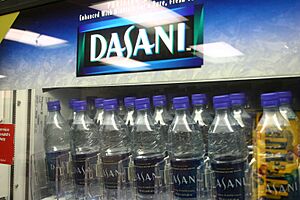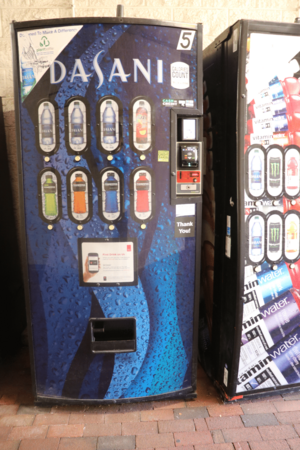Dasani facts for kids
 |
|

A Dasani vending machine.
|
|
| Type | Water beverage |
|---|---|
| Manufacturer | The Coca-Cola Company |
| Country of origin | United States |
| Introduced | February 1999 |
Dasani is a popular brand of bottled water made by The Coca-Cola Company. It was first sold in 1999. Dasani is one of many water brands that Coca-Cola sells around the world.
The water for Dasani comes from local city water supplies. It goes through a special filtering process and then has a small amount of minerals added to it for taste.
Contents
How Dasani is Made and Sold
Making the Water
Coca-Cola gets water from local municipal water supplies, which is the same source as tap water. They then use a process called reverse osmosis to filter it. This process pushes water through a very fine filter to remove impurities.
After filtering, Coca-Cola adds tiny amounts of minerals. These include magnesium sulfate (Epsom salt), potassium chloride, and sodium chloride (table salt). These minerals are added to give Dasani its specific taste.
Selling Dasani Around the World
Dasani is sold in many countries, but sometimes with different names or flavors.
North America
Dasani was first launched in the United States in 1999. It came to Canada a year later in 2000. In Canada, it is sold in many different bottle sizes, from small 355 mL bottles to large 1.5 L bottles.
Latin America
In some countries in Latin America, Dasani is sold under different names or with added flavors.
- In Brazil, it was called Aquarius.
- In Chile, it was sold in regular, lemon, and tangerine flavors.
- In Mexico, it was sold as Ciel Dasani with flavors like lemon-cucumber and papaya-carrot, but it is no longer sold there.
- It was also released in other countries like Colombia, Argentina, and Peru.
The United Kingdom
Dasani's launch in the United Kingdom in 2004 did not go well. News reports revealed that the water was treated tap water from a town called Sidcup. While Coca-Cola never claimed the water came from a natural spring, some people felt the marketing was not clear.
A bigger problem happened when officials found that some of the water had too much of a chemical called bromate. Bromate is a substance that is suspected of being harmful to humans if consumed in large amounts. The amount found was above the legal limit.
Because of this, Coca-Cola had to recall half a million bottles and stopped selling Dasani in the UK. The situation was compared to an episode of a popular British TV show where a character tried to sell tap water as fancy bottled water.
Dasani and the Environment
Many people are concerned about how bottled water affects the environment. Coca-Cola has started several programs to make Dasani more eco-friendly.
New Types of Bottles and Cans
- PlantBottle: Coca-Cola created a new bottle called the "PlantBottle." It is made from a mix of recycled plastic and plastic made from plants. These bottles are still recyclable. The company hopes this will reduce the amount of new plastic they use.
- Aluminum Cans and Bottles: In 2019, Dasani started being sold in aluminum cans and bottles. Aluminum is recycled more often and more easily than plastic. However, making a new aluminum can creates more carbon emissions than making a new plastic bottle.
Reducing Waste
- Dasani PureFill: This is a program where people can refill their own bottles with filtered Dasani water from special machines. This helps reduce the number of single-use bottles.
- "How2Recycle" Labels: In 2020, Dasani added new labels to its bottles with clear instructions on how to recycle them.
Water Sources and Litter
Dasani gets some of its water from areas in California that have experienced low rainfall. This has raised questions about using water resources for bottling.
Plastic bottles are a major source of litter. In 2011, plastic bottles made up 30% of the trash in the Grand Canyon. Because of this, the park banned the sale of bottled water in 2012.
Health and Safety
Some studies have found tiny pieces of plastic, called microplastics, in Dasani and other brands of bottled water. Scientists are still studying how microplastics might affect people's health.
See also
 In Spanish: Dasani para niños
In Spanish: Dasani para niños
- Deep River Rock – a brand of tap water, produced by Coca-Cola, sold throughout Ireland
 | Calvin Brent |
 | Walter T. Bailey |
 | Martha Cassell Thompson |
 | Alberta Jeannette Cassell |



